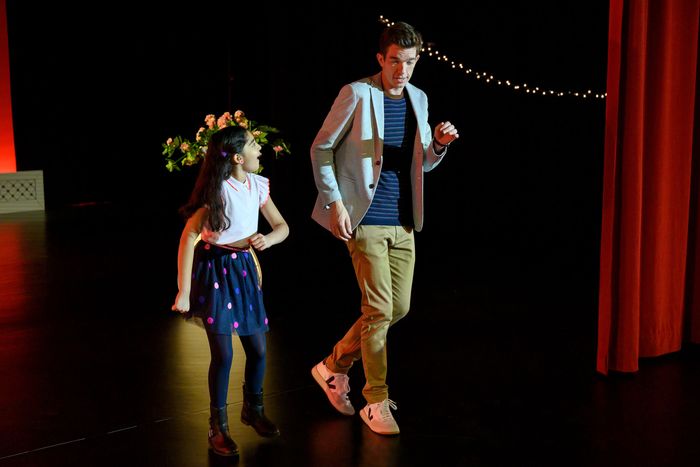
If most comedy operates by creating and resolving tension, the primary tensions underneath John Mulaney’s new Netflix project, a children’s musical-comedy special called John Mulaney & the Sack Lunch Bunch, are existential ones.
What is this? (Is it sincere? Is it a parody? Is it a special for children? For adults? For John Mulaney? The answer to that last question is clearly yes.) Why is this? For a creator wildly popular as a stand-up comedian and comedy writer, the pivot to children’s musical special is bound to perplex at least some of his audience. Why is this … this? Why is The Sack Lunch Bunch modeled after children’s specials from the ’70s and ’80s, full of grungy graphics and low-fi animated interruptions? Why is it placed on a bedrock of niche New York jokes and given a top note of death obsession?
Sack Lunch Bunch’s undercurrent of existential anxiety shows up right at the top, as Mulaney sits among a group of kid actors and performers, the titular Lunch Bunch. “What’s the tone of this show?” a girl asks him. “What do you mean?” Mulaney says. “She means, ‘Is it ironic?’ Or do you like doing a children’s show?” another girl chips in. “That’s the million-dollar question,” Mulaney tells the gathered kids. He likes doing the show, he says. It’s fun. “But honestly,” he continues, “if it doesn’t turn out great, I think we should be like, ‘Oh, it was ironic.’ But if it turns out really good, we’ll be like, ‘Oh thank you, we worked really hard.’”
That answer is clearly flippant, in all the ways that a really flippant answer betrays something about the anxieties underneath the flippancy. The more profound version of the answer — the simplest and best resolution to the tension underneath Sack Lunch Bunch — is one that comes right before as Mulaney first starts speaking with the kids. “What you’re about to see is a children’s TV special,” Mulaney says to the camera, “and I made it on purpose.”
John Mulaney & the Sack Lunch Bunch is a few things besides a children’s TV special. It’s patently meant for adults as well as kids, for one thing. It’s a flagrantly nostalgic thing, as Mulaney also owns right at the top, a callback to the era when Sesame Street was a little dirtier and the rhythms of children’s programming had more Monty Python in them and less plodding pedantry. It feels a little like a bleaker Free to Be … You and Me, a piece of musical storytelling that started with the relatively radical proposition that kids and adults are all intelligent, emotional people.
But beyond that, it is patently, unquestionably what Mulaney describes it to be: a thing that he made on purpose. There’s so much care and craft in Sack Lunch Bunch. All the musical numbers work, and occasionally they’re breathtakingly good. (Did you know your life needs André De Shields singing about how algebra cost him one of his eyes and refusing to explain further? I did not know this about my own life, and I’ve now been enlightened.) Most of the kid performers seem destined for Jimmy Awards. The blatant lie of The Sack Lunch Bunch’s opening-credits song, that the special’s only guest star will be Richard Kind, is proved false when De Shields, Natasha Lyonne, David Byrne, and eventually Jake Gyllenhaal also show up. David Byrne wears an Elsa-from-Frozen costume. Marlon Jackson’s grandson sings a song about seeing random white women weeping all over New York. A fast interstitial graphic with all the fidelity of a 12th Xerox copy asks the kids to play along at home by putting a list of names in order. The list is of New York City mayors.
It’s the kind of collection that could seem random and unmotivated, except every bit of it is tied together by Mulaney’s fascination with the way kids experience the world, and the way his own brain exists simultaneously as him-as-a-child and him-as-an-adult. Nearly all the songs are from the point of view of a child who takes herself very seriously. It’s not “Kids say the darndest things,” it’s “Kids have legitimately fascinating and disorienting perspectives grounded in very real emotion.”
There are a few endings to Sack Lunch Bunch. The first of them is the big showstopping finale number, a performance by Jake Gyllenhaal as an increasingly frantic children’s performer called Mr. Music. When the premise of the number kicked in, I expected to hate it. Within 45 seconds, I was laughing so hard I could not see. Then, there are several clips of Mulaney, the kids, and some of the guests, talking about their biggest fears and their hopes for the future.
Then finally, right at the end, André De Shields returns, speaking straight into the camera. I don’t want to spoil what he says, although it’s essentially unspoilable because De Shields’s comments could come from the script of truly any children’s TV special. It is, inevitably, a message about being yourself. But De Shields performs it as though it is crucial, as though it is the most important message he could possibly say to his audience. It could come off as such a cliché. But The Sack Lunch Bunch is a full-throated demonstration of the delights of seeing and being seen. The special ends with De Shields telling viewers to be their truest selves, and Sack Lunch Bunch is John Mulaney doing exactly that.


